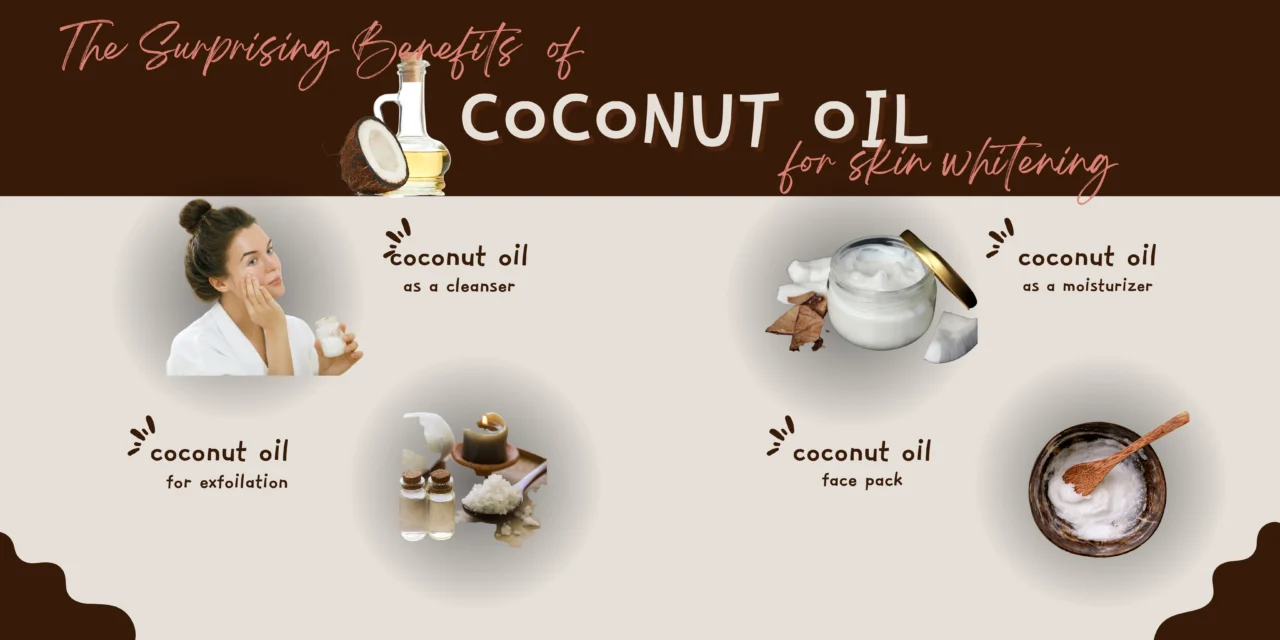Are you tired of using chemical-laden products for skin whitening that do more harm than good? It’s time to switch to all-natural and versatile coconut oil. Over the centuries, coconut oil has been used for its numerous benefits for skin and hair. Discover the secret to radiant skin with our coconut oil for skin whitening products. Say goodbye to dullness and hello to a brighter complexion!
Are you aware that it can also brighten and lighten your skin tone? In this article, we will examine the benefits of coconut oil for skin whitening and provide tips and tricks for achieving radiant and glowing skin.
From DIY face masks to body scrubs, we have covered the best coconut oil-based recipes you can easily make at home. So, say goodbye to harmful chemicals and hello to the wonders of coconut oil for skin whitening.
Get ready to transform your skin naturally and effortlessly with our ultimate guide to using coconut oil for skin whitening!
Table of Contents
How does using coconut oil for skin whitening work?
Iron, Vitamin E, and K are among the nutrients in coconut oil that are essential for healthy skin. It also has antioxidant qualities that aid in the fight against free radicals, which can harm the skin and cause premature ageing.
Additionally, the anti-inflammatory qualities of coconut oil can aid in reducing skin inflammation and redness.
The high concentration of lauric acid in coconut oil is one of the main factors contributing to its effectiveness for skin whitening. A fatty acid called lauric acid can penetrate deeply into the skin and lighten the skin.
It transforms into monolaurin, which can aid in lowering melanin synthesis. Moreover, This pigment provides the skin’s colour. Coconut oil can naturally brighten and lighten the skin tone by lowering melanin production.
Capric acid, which has anti-fungal and anti-bacterial properties, is another component of coconut oil. Due to these qualities, it is efficient in treating skin infections and minimizing the visibility of blemishes.
Coconut oil can help to even out the skin tone, resulting in brighter, more radiant skin by minimizing the appearance of blemishes.

Unveiling the Science: Understanding the Mechanisms Behind Coconut Oil’s Skin Brightening Potential
The epidermis is the top layer of the skin, which has several layers altogether. Melanocytes, cells that create melanin, are found in the epidermis.
The pigment melanin gives colour to the skin, hair, and eyes. Furthermore, Skin darkening or hyperpigmentation can result from excess production of melanin.
By blocking the tyrosinase enzyme, coconut oil can aid in reducing melanin production. The tyrosinase enzyme is in charge of producing melanin.
Coconut oil can assist in lowering the production of melanin by inhibiting this enzyme, resulting in skin that is lighter and more radiant.
Additionally, using coconut oil to exfoliate the skin can leave it looking younger and brighter by removing dead skin cells.
Types of Coconut Oil for whitening skin
There are two main types refined and unrefined coconut oil.
Refined coconut oil
Coconut oil is created by bleaching, deodorizing, and refining the oil with the help of harsh chemicals and high heat.
Due to this some of the oil’s nutrients and natural qualities are lost during this process, and it is less effective for skin whitening.
Unrefined Coconut Oil
Instead of using chemicals or high heat, unrefined coconut oil is created by pressing the coconut meat and extracting the oil. This coconut oil is more effective for skin whitening because it retains all-natural nutrients and qualities.
Unrefined coconut oil must be chosen if you want to use it to whiten your skin. Look for virgin coconut oil that is cold-pressed, organic, and has not been refined.
Unlock the Secrets: How to Harness the Power of Coconut Oil for Skin Whitening
Coconut oil can be applied in a variety of ways. Here is the following step-by-step tutorial on how to whiten skin with coconut oil:
Preparing your skin
Before applying coconut oil, it’s important to prepare your skin by cleansing and exfoliating. This will make it easier for the coconut oil to penetrate the skin by removing any dirt, oil, or dead skin cells.
- Start by giving your face warm water and gentle cleanser wash.
- With a fresh towel, pat your skin dry.
- After that, scrub or brush your skin gently to exfoliate it.
This will make it easier for the coconut oil to penetrate the skin by removing dead skin cells and impurities.
Applying coconut oil
Apply the coconut oil after cleaning and exfoliating your skin.
- Warm up a small amount of coconut oil by rubbing it between your palms. This will facilitate the oil’s melting and easier spread across the skin
- Next, gently massage coconut oil into your face and neck in circular motions.
- Spread the oil evenly over your skin, covering every inch.
If you’re using it topically, apply coconut oil to the desired body parts, such as your arms, legs, or back.
Massaging techniques
Use gentle massage techniques to help the coconut oil penetrate the skin more thoroughly.
- Start by using circular motions to massage your face and neck, working your way outwards from the centre of your face.
- Make long, sweeping motions from your feet to your heart to move your body.
- Massage the oil into your skin for 5–10 minutes or until the coconut oil is completely absorbed.
This will ensure that coconut oil penetrates the skin more effectively and helps to improve blood circulation.
Using coconut oil topically
For best results, leave the coconut oil on your skin after massaging it for at least 30 minutes or overnight.
The coconut oil will be able to penetrate the skin and perform its magic as a result.
After a shower or bath, you can use a small amount of coconut oil as a moisturizer.

Coconut oil skincare routine for overall skin health
There are many ways to use coconut oil for healthy skin overall. Here is a quick skincare routine using coconut oil:
1. Cleaning: You can naturally cleanse and remove makeup with coconut oil. Put a little coconut oil on your face and thus gently massage it in. Dry off after rinsing with warm water.
2. Exfoliating: Combine coconut oil with salt or sugar to make a natural exfoliating scrub. Dead skin cells can be removed once a week and reveal brighter, smoother skin.
3. Moisturizing: Apply a small amount of coconut oil to your skin after showering or bathing for deep hydration and nourishment.
4. Face mask: Mix coconut oil with honey or turmeric to create a brightening face mask. Apply to your face and leave on for 10-15 minutes before rinsing off.
Other natural remedies for skin whitening
Other natural remedies, besides coconut oil, can aid in skin lightening and brightening. Here are a few instances:
- Lemon juice: It contains natural bleaching agents that can assist in skin lightening. Lemon juice should be applied to the skin and left on for 10 to 15 minutes before rinsing.
- Turmeric: This spice is anti-inflammatory and brightens the skin. To make a brightening face mask, combine turmeric with honey or yoghurt.
- Papaya: This fruit has enzymes that naturally exfoliate the skin and lighten its tone. Apply mashed ripe papaya to your skin for 10 to 15 minutes, then rinse it off.
Benefits of using coconut oil for skin whitening
Coconut oil does offer several potential benefits for the skin, which could indirectly contribute to a brighter and more even complexion. Here are some general benefits of using coconut oil for skincare:
Moisturization:
Coconut oil is an excellent moisturizer for the skin. It contains fatty acids that help to nourish and hydrate the skin, keeping it soft and supple.
Proper moisturization can improve the skin’s overall appearance, making it look healthier and potentially enhancing its natural radiance.
Antioxidant properties:
Coconut oil contains antioxidants, such as vitamin E, that can help protect the skin from free radical damage. Free radicals are unstable molecules that can lead to premature ageing and dull-looking skin.
By combating free radicals, coconut oil may help maintain a youthful appearance and promote a more radiant complexion.
Unleashing the Power of Skin Barrier Function:
The fatty acids in coconut oil can reinforce the skin’s natural barrier function. A healthy skin barrier helps to retain moisture, prevent water loss, and protect against environmental stressors. When the skin barrier is solid and intact, the skin can better maintain its optimal condition, including a more even skin tone.
Anti-inflammatory effects:
Coconut oil possesses anti-inflammatory properties, which can benefit skin conditions such as acne, eczema, or dermatitis. Reducing inflammation may help calm irritated skin and promote a clearer complexion.
Makeup removal:
Coconut oil can be a natural and gentle makeup remover. It effectively dissolves makeup, including waterproof products, while moisturizing the skin at the same time. Removing makeup thoroughly can help prevent clogged pores and promote a brighter appearance.

Tips and tricks for using coconut oil for skin whitening
Here are some tips and tricks for using coconut oil for skin whitening:
- Use coconut oil regularly to see the best results. Consistency is vital when it comes to skin whitening.
- Mix coconut oil with other natural ingredients, such as lemon juice or turmeric, to enhance its skin-whitening properties.
- Always use unrefined coconut oil for maximum benefits.
- Apply coconut oil to damp skin for better absorption.
- Use coconut oil as a makeup remover for a natural and effective alternative to harsh chemicals.
- Avoid using too much coconut oil, which can clog pores and lead to breakouts.
Is coconut oil safe to use for whitening skin?
If you use unrefined coconut oil sparingly, coconut oil is safe for skin whitening.
How long does it take for coconut oil to start working to lighten skin?
It can take weeks to months to see results from using coconut oil for skin whitening. Consistency is vital when it comes to seeing results.
Can coconut oil cause breakouts?
Coconut oil can clog pores and cause breakouts if used in excess. Use coconut oil in moderation and avoid using too much on oily or acne-prone skin.
Conclusion:
A natural and adaptable substance like coconut oil can help to lighten and brighten the skin tone. Due to its high lauric acid content and anti-inflammatory properties, it effectively reduces skin inflammation and melanin production.
By using coconut oil regularly and incorporating it into your skincare routine, you can achieve radiant and glowing skin naturally and effortlessly. Embrace a Natural Alternative: Bid farewell to harmful chemicals and welcome the wonders of coconut oil for skin whitening!





